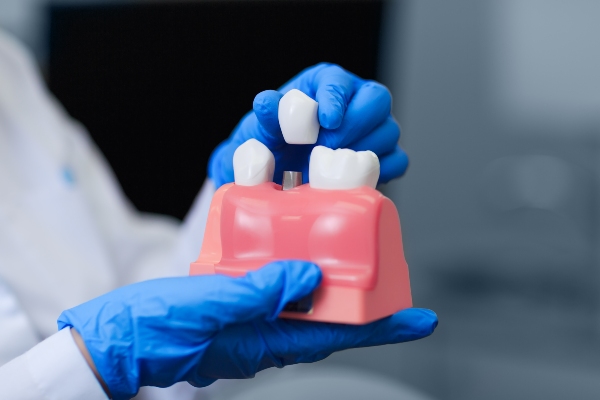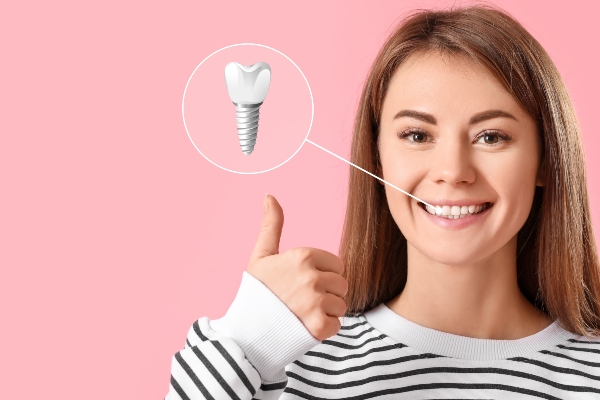Caring for CEREC® Crowns

There are several benefits to CEREC® crowns that may cause a patient to choose them over traditional crowns. The process to get the impression of a patient’s mouth and to create the crown are completely different than that of traditional ones. After putting a lot of thought into getting a CEREC® crown, the last thing you want is to accidentally ruin it or need a replacement prematurely.
4 facts to know to maintain proper care
While CEREC® crowns can seem significantly different than traditional ones, the end result is mainly the same. They can be treated and cared for similarly to other dental crowns. Here are tips for keeping up oral health and making sure that new crown goes the distance.
1. What you eat matters
Obviously, the foods and drinks people consume are what come into contact with teeth, and it is likely that they may cause some problems if a patient is not eating the right things. Incredibly chewy, hard or sticky foods have the potential to dislodge CEREC® crowns or damage them through cracks or breaks. These are foods to avoid after receiving a new crown:
- Gum
- Sticky desserts like taffy
- Vegetables that require a lot of chewing
- Hard candy
Other foods may also cause discomfort after a crown has recently been put in because the area around the tooth is still sensitive. Avoid hot foods like soup, cold foods like ice cream and sugary foods to help keep from triggering that sensitivity, though each person may have a different reaction.
2. Oral hygiene is more important than ever
Every dentist repeats this time and time again, but brushing teeth twice a day and flossing once a day is important in maintaining both natural teeth and artificial crowns. While a crown is covering a tooth, some of the original tooth can still be exposed at the base. Flossing helps ensure no plaque builds up or any food particles get stuck. Do not worry about floss popping a permanent crown off — it should be glued on well enough that it can be treated like any other tooth.
3. Certain bad habits can negatively impact a crown
Many people are told that biting their nails is a bad habit because it is unattractive and grinds nails down to stubs. However, it is also bad for teeth, the same as chewing on pencils or pens, grinding teeth and chewing ice cubes. These behaviors could cause CEREC® crowns to crack or break. The last thing anyone wants is to replace a crown that was recently placed.
4. Night guards help protect teeth
Grinding teeth is another bad habit, but it sometimes occurs in the middle of the night when a person is asleep. Since this habit cannot consciously be halted, wearing a night guard can protect teeth from each other and prevent damage from grinding.
Conclusion
CEREC® crowns, like any type of crown, require care and maintenance to ensure they will not need to be replaced sooner than planned. Understanding how habits and hygiene impact them can make crowns last even longer than expected.
Are you considering CEREC® crowns in the Forest Hills area? Get more information at https://metrosmiles.com.
Check out what others are saying about our dental services on Yelp: CEREC Crowns in Forest Hills, NY.
Recent Posts
For patients who have damaged or decaying teeth, dental restorations may be a necessity. Dentists use a variety of restorative procedures to protect and repair the structural integrity of an individual's teeth. Some of the most common restoration procedures may include dentures, crowns, and fillings.No individual should suffer from severe tooth pain or discomfort. Decaying…
Numerous things can interfere with a good smile. Whether it is a missing, cracked, chipped, damaged, or decayed tooth, dental restorations help improve how you look, prevent future dental issues, and improve the function of your teeth and mouth. Depending on the type and severity of the issue, there are various restoration procedures available.Some people…
Dental restorations can improve overall health by decreasing the chances of infection, decay, and issues caused by broken or misaligned teeth. These treatments range from removing teeth, replacing tooth structures that have decayed, and correcting the patient’s overall bite to improving eating and drinking.A restoration may be performed for cosmetic or health-related reasons, but even…
Dental restorations have been used for thousands of years. In fact, a 2012 article published by The New York Times details the discovery of a 6,500-year-old human jawbone. Considered the earliest evidence of dental fillings, it had beeswax in one tooth, which researchers believe was to ease the pain of a crack. These days, restorations…


